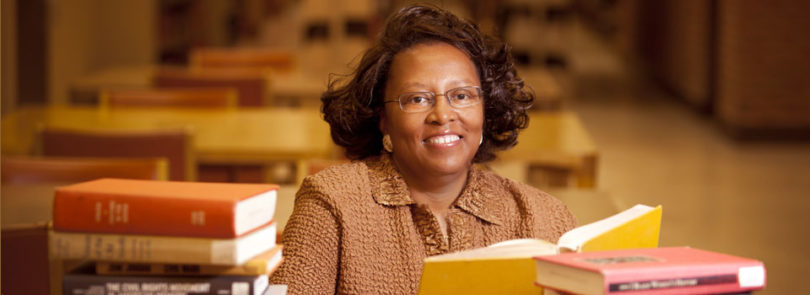McCaskill conducts archival research about 19th- and early 20th-century African American writers and has developed “Reacting to the Past” classes about UGA’s 1961 desegregation.
Where did you earn your degrees, and what are your current responsibilities at UGA?
I earned a Ph.D. and an M.A. in English from Emory University. I earned a B.A. in English (summa cum laude) from Columbus State University, which was Columbus College when I attended. As an associate professor, I teach graduate and undergraduate courses, counsel and mentor English majors and CURO students, direct theses and dissertations, publish and present my research and serve on and/or chair various committees. I am an affiliate faculty member of the Institutes for Women’s Studies and African American Studies.
When did you come to UGA, and what brought you here?
I came to UGA in 1998. The English Department wanted to build its offerings in African American and ethnic American literature. In addition to writing about and developing courses in these fields, I have directed graduate students who are now tenured or tenure-track professors.
What are your favorite courses, and why?
I enjoy teaching Survey of African American Literature (AFAM/ENGL 3230). I am enthusiastic about any opportunity to discuss the range of the canon, the big picture, from the 18th century to now. Students from all majors make for very stimulating discussions.
What interests you about your field?
I love conducting archival research about 19th- and early 20th-century African American writers because it is a challenging endeavor. There are many silences and gaps to fill, and I love the detective work and attention to detail I bring to fill them. Where written records and firsthand accounts of early African Americans can be sparse, I have to know how to read between the lines for information and to interpret primary documents such as maps, census records, newspaper reports, advertisements and photographs. I am completing a book about William and Ellen Craft, two former slaves from Georgia. They published a memoir in England in 1860, but left behind few letters and firsthand manuscripts. To shape a narrative of their life and work as abolitionists and teachers, I have to look beyond their memoir. For similar research, I earned an award for Excellence in Research Using the Holdings of an Archives from the Georgia Historical Records Advisory Board with history student Christina L. Davis. To piece together the life and work of civil rights activist J. Richardson Jones (1901-1948), we visited nine archives and museums in Georgia and Florida over a three-year period. I enjoy such multidisciplinary undertakings that rely on many methods of investigation: literary, historical, cultural, visual.
What are some highlights of your career at UGA?
I was delighted to receive a General Sandy Beaver Teaching Professorship in 2005. Since 2006, I have worked with a dynamic team of UGA undergraduates, graduate students and librarians on various projects related to the Civil Rights Digital Library. We made a documentary, How We Got Over, for Andrew Young’s nationally syndicated television program, and won a regional EMMY. Besides getting an ultra-cool statuette, it’s been a tremendous thrill to meet civil rights activists such as Andrew Young, Charlayne Hunter-Gault, and Rutha Harris and Rev. Charles M. Sherrod from the Albany Movement through this project.
How does your research or scholarship inspire your teaching?
I have been able to infuse my scholarship in my classroom teaching as I develop Reacting to the Past games based on the 1961 desegregation of UGA and the 1968 Poor People’s Campaign. Since my research on the Civil Rights Movement has produced collaborative publications with students at UGA, I enjoy that I am now collaborating with undergraduate classes to refine the rules of the games, develop characters and identify research resources from UGA Libraries’ special collections that will provide participants with helpful historical and cultural context. I also find myself giving the CURO apprentices I supervise ideas for their own projects from the films and literature I’ve found in my own research.
What do you hope students gain from their classroom experience with you?
I want my students to learn the fundamentals of good research: looking for and theorizing about patterns, thinking outside of the frame, communicating their findings in accessible yet scholarly language, asserting their ideas with confidence about how and why they matter.
Describe your ideal student.
The ideal student reads widely, writes regularly, enjoys attending campus lectures outside of class and puts effort into getting to know a few professors well.
Favorite place to be/thing to do on campus is
… to walk after a long day from Park Hall to the Georgia Museum of Art and back, especially during the fall when the air is cool and the leaves crunch under my feet.
Beyond the UGA campus, I like to
… play the cello. Traveling frequently as “military brat” in my childhood, I missed out on music lessons. I’ve always wanted to play an instrument, so I started to learn last fall. I don’t practice as regularly as I need to, but I’m having fun. I also enjoy visiting with family who live in the state and taking “big city” breaks in multiethnic places like Boston and New York City.
Favorite book/movie?
Jhumpa Lahiri’s The Interpreter of Maladies. If I can’t read the whole collection of stories every year, I read “The Third and Final Continent.” I am fascinated by the technical virtuosity and emotional intensity of Lahiri’s work. My favorite film is a tie between Francis Ford Coppola’s The Godfather and Jacques Audiard’s Un Prophète. I like the gangster genre.
Proudest moment at UGA?
I wanted to attend UGA as an undergraduate. However, my family could not afford it with another child also in college, even though I was my senior class salutatorian. There was no HOPE Scholarship then. I could not come to UGA as an undergraduate, yet now I am a professor here. I am also proud of this accomplishment because my mother grew up in Georgia during segregation, when UGA denied admission to African Americans.








